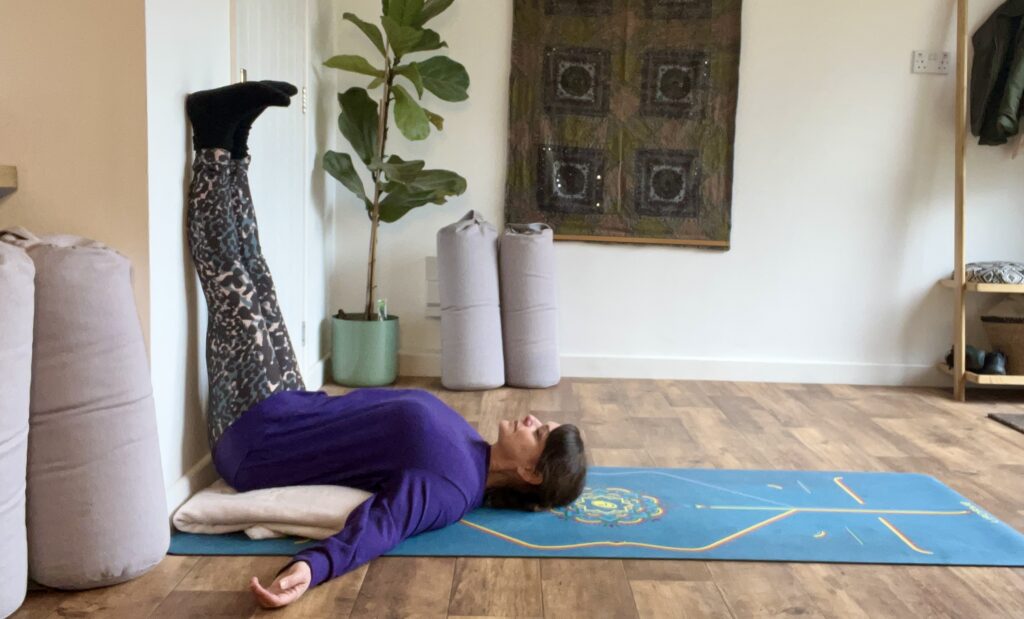
Yoga Teacher and holistic therapist Michelle Howard is Folk Features’ latest key partner, and will be writing a monthly column for the Press Pause section. First up, she explains how a gentle yoga exercise can help settle the mind before bedtime
For thousands of years many cultures have believed in the importance of rest at times of change in a woman’s life. During menstruation and pregnancy, women and girls were encouraged to join together, to be nurtured with massage, food, rest and sleep. During the menopause, a time of hormonal change, rest is so important as is sleep, but as many of us know that’s not always so easy.
Fluctuating hormones in perimenopause and menopause can cause changes and disruption to sleep patterns, leading to fatigue and overwhelm. And, let’s face it, tiredness makes coping with any symptoms of the menopause much worse.
So, what might be causing this change in sleep patterns?
Oestrogen and progesterone support many different areas of the brain, and these are the hormones that rollercoaster during perimenopause (remember, this time before periods stop completely can go on for years for some women). These hormones help produce and release serotonin and other neurotransmitters that help us sleep and relax. Hot flushes and night sweats and increased body temperature may disrupt sleep patterns. There can be more stress and worry – juggling many areas of personal, work and family life – and this leads to raised cortisol levels and adrenal fatigue, affecting sleep.
Tips to help:
The menopause yoga mantra is “rest, do less and reduce stress” – fat chance, you may be uttering! But making more time for yourself during the day does help the mind to settle at night. Gentle yoga exercises and stretches before bed can help release excess energy from the muscles – and also help to settle the mind.
One of the reasons we may wake in the middle of the night is from a sugar rush and undigested foods from eating late. Our metabolism and kidney function slows, so caffeine and alcohol can take 8-10 hours to clear. Eating earlier can make a big difference.
Keeping a sleep journal can help us notice any triggers. I will be covering more information about journaling as a tool to support the menopause next month.
There are some foods that can promote sleep:
Turkey contains the amino acid tryptophan which promotes sleep and a good mood.
Almonds are a natural source of melatonin and magnesium (magnesium is a hero for sleep)
Kiwi fruit contains serotonin which regulates sleep. Try 1-2 kiwi fruit before bed
Passionflower tea is calming and promotes sleepiness
Chamomile tea contains apigenin which has a sedative affect.
‘Legs up a wall’ – My hero yoga pose for a restful night’s sleep:

Practice this before bed to help calm the nervous system and reduce stress (this can also help reduce restless legs)
- Fold a blanket and place close to the wall
- Have a pillow in place to support your head
- Snuggle your hips close to the wall
- Slowly lower your back to the ground and place your feet flat on the wall
- Get as close to the wall as you can and walk your legs up the wall to rest
- Close your eyes and relax shoulders, face and belly
- Focus on slow and steady breaths or try breathing in and out through the left nostril
- Stay for 15-20 minutes
- To come up, hug both knees into chest and slowly roll to one side – move slowly.
Avoid this pose if you have any eye related conditions such as glaucoma or recovering from cataract surgery. If there is any discomfort, please slowly come out of this pose. If you’re concerned about the discomfort, please get in touch with myself or your GP.
Good luck!
Visit Michelle Howard Yoga & Therapies. The next online yoga menopause class is Sunday May 5, from 5-6pm. Book via the website.









Leave a Reply